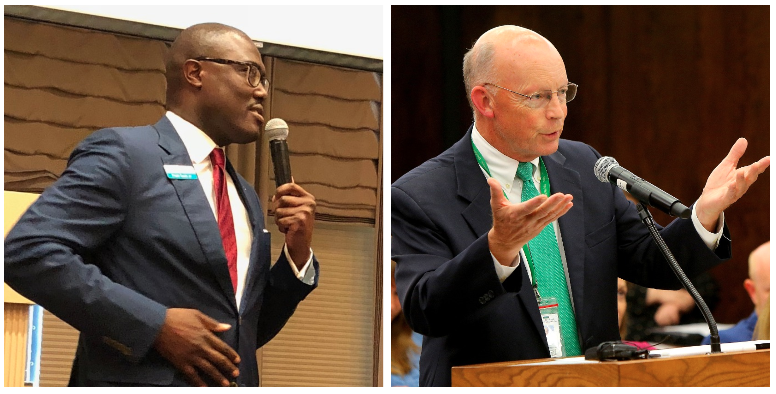The question of how much power the mayor's office could have has taken center stage in the Little Rock mayor's race.
Candidates Baker Kurrus and Frank Scott Jr. face off in a runoff election Dec. 4, and both say they plan to strengthen the role.
Little Rock has a city manager form of government, meaning a city manager appointed by the Board of Directors runs day-to-day operations. Usually that is paired with a part-time mayor, but an ordinance approved by voters in 2007 added substance to the city's top office.
Per ordinance No. 19761, being Little Rock's mayor is a full-time job. The statute grants the position authority over issues including the preparation of the city budget and grants veto power.
The mayor has the power to hire and fire the city manager, the city's chief administrative officer, and to nominate and fill any vacancy occurring on any board, authority or commission, with approval from the city Board of Directors. The ordinance also states that the duties given the city manager by state law shall be performed at the direction of the mayor.
[RELATED: Stodola reflects on his 12 years in office]
Aside from those additional powers, Little Rock's current form of government was established in 1993. A voter-approved ordinance allowed the city to directly elect its mayor while keeping the city manager position and to have a city board made up of seven ward representatives and three at-large members.
POLICYMAKING POWER
Kurrus, an attorney and business consultant, says in a statement on his campaign website that giving more power to the mayor while keeping the city manager position has created a dual system that is "inefficient, confusing and wasteful."
The former state-appointed superintendent of the Little Rock School District said he would merge the staffs of the mayor and the city manager, allowing them to operate as one executive team.
Kurrus, 64, said he would use the mayoral role to chair the city Board of Directors, casting a vision, formulating ideas and facilitating much of the board's discussion while working with city directors to set goals and make policies. In a recent interview, he said he believes he can help board members get back to the policymaking role he says their positions are designed to fulfill.
[Speak out: Share your thoughts about Little Rock mayor's race with reporter]
"It seems to me like board members spend an awful lot of time on constituent service, which is fine, there's nothing wrong with that," Kurrus said. "I would like to see this body work more closely and vigorously on policies with respect to growth, with respect to homelessness, with respect to community policing."
Scott, a banker and associate pastor, outlined his plan for the city's form of government during a news conference earlier this month.
Scott, 35, said the mayor should also have the power to hire and fire the city attorney and department heads. He advocated converting the city manager into a chief operating officer who manages the day-to-day administration of the city but leaves executive, policymaking decisions to the mayor's office.
Many credit current Little Rock Mayor Mark Stodola with heightening the role's profile. He became the city's first full-time mayor since the switch to the city manager form of government and to part-time mayors in 1957.
Jim Dailey, Stodola's predecessor, was Little Rock's first popularly elected mayor after the 1993 ordinance passed.
Toward the end of Stodola's first month in office in 2007, discussion of the strong-mayor issue had begun among the city Board of Directors. It was referred to voters in August of that year.
The move had grassroots support, according to community activist Jim Lynch.
"Little Rock's problems aren't part-time problems. We need a full-time mayor," reads one flier from the campaign that Lynch provided to the Democrat-Gazette.
Lynch said having a politician to hold accountable as the city's top officer is beneficial, adding that the energy going into Kurrus' and Scott's campaigns will carry over once they are elected.
"They will change what goes on in Little Rock City Hall," he said.
Dailey said he believed that move was "absolutely good for the city," but that Little Rock still has a ways to go on adjusting its form of government. He said the city should move to a strong-mayor system.
"We need to finish the job on that," he said. "[Stodola] moved us one step closer."
'MORE OF A VOICE'
Additionally, Scott said he would plan to replace at-large directors with additional ward representatives if elected. Those directors would represent multiple wards, he said. During his campaign, he has noted the need for greater representation of the city's west, southwest and midtown areas.
Scott said replacing at-large directors would "give more of a voice to our neighborhoods and give us a Board of Directors that looks more like Little Rock."
When the question of how to approach at-large directors was raised at a forum earlier in the campaign, Kurrus said he would study the issue and any change would be community-driven.
Until the 1993 ordinance, all city board members served at-large.
At-large City Director Dean Kumpuris called for a study on Little Rock's form of government at the Nov. 20 city Board of Directors meeting. Kumpuris asked City Attorney Tom Carpenter to write a resolution stating that the board's first order of business in 2019 would be a yearlong study on the form of government. The proposed resolution, if drafted, would be voted on by city directors at their Dec. 3 meeting.
"We need to get it on the table before we have an election," Kumpuris said.
Early voting for the runoff election begins Tuesday.
Metro on 11/26/2018

